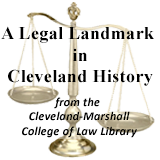Mapp v. Ohio - 367 U.S. 643 (1961)
Supreme Court of Ohio (Case No. 36,091)
Attorney Kearns appealed the appellate court's decision and filed a Notice of Appeal with the Supreme Court of Ohio. In addition to his previous arguments, Attorney Kearns listed the following assignments of error:
- The Ohio anti-obscenity statute was unconstitutional, based on both the First and Fourteenth Amendments to the U.S. Constitution, because (1) the statute was vaguely written and did not define standards for what defined obscene, and (2) the anti-obscenity laws of other states were directed at sellers, publishers, and exhibitors of obscene materials, not those who merely possessed it;
- Mapp's constitutional right to equal protection may have been infringed upon because the statute allowed the prosecutor and grand jury to decide whether each possession of obscene materials charge should be tried as a felony or a misdemeanor;
- The "shocking conduct" of the police violated Mapp's Fourth and Fourteenth Amendment rights to due process, based on Rochin v. California, 342 U.S. 165 (1952).
On May 27, 1959, Attorney Kearns' filed a Brief of Defendant-Appellant, which set forth his arguments on appeal. John Corrigan, Prosecuting Attorney for Cuyahoga County, along with Assistant Prosecuting Attorney Mahon, filed a Motion to Dismiss the appeal along with a Brief of Plaintiff-Appellee, stating that there was no debatable constitutional question in Mapp's case. In response, Attorney Kearns filed a Brief of Defendant-Appellant in Reply and Opposing Motion to Dismiss.
During the appeal, the Ohio Civil Liberties Union (OCLU) approached Attorney Kearns and offered to write an amicus curiae brief on Mapp's behalf. Attorney Kearns and the Ohio Supreme Court both agreed to allow the OCLU to participate. The Amicus Curiae Brief, submitted October 26, 1959, argued: (1) the Ohio anti-obscenity statute violated the due process clause of the Fourteenth Amendment to the U.S. Constitution; (2) the statute interfered with privacy rights under the Fourth, Fifth, and Fourteenth Amendments to the U.S. Constitution; and (3) the statute violated the equal protection clause of the Fourteenth Amendment to the U.S. Constitution.
On March 23, 1960, the Supreme Court issued its decision. Although a simple majority, four of the seven Justices, voted to reverse the Court of Appeals' decision, Mapp lost her appeal because of a technicality under Ohio law: a super-majority was required to rule any law unconstitutional.
Justice Kingsley A. Taft authored the opinion for the court majority. Justice Taft articulated that the lower courts were correct in holding that Mapp had control of the obscene material. Further, he found that the lack of a warrant did not affect the outcome of Mapp's case under State v. Lindway, 131 Ohio St., 166 and Wolf v. Colorado, 338 U.S., 25 because Ohio courts were allowed to admit unlawfully seized evidence in criminal trials. He also noted that Rochin v. California, 342 U.S. 165 did not apply because the police officers' conduct was not overly shocking; and therefore, there was no violation of Mapp's due process rights under the Fourteenth Amendment to the U.S. Constitution. Finally, Justice Taft held that Ohio's anti-obscenity statute was constitutionally invalid; however, the Supreme Court of Ohio was bound to affirm the opinion of the Eighth District Court of Appeals of Ohio, Cuyahoga County, under article IV, section 2 of the Ohio Constitution (the aforementioned "technicality" requiring a super-majority to overturn laws).
Attorney Kearns unsuccessfully requested a re-trial. He subsequently appealed the decision of the Supreme Court of Ohio to the Supreme Court of the United States on June 15, 1960.




